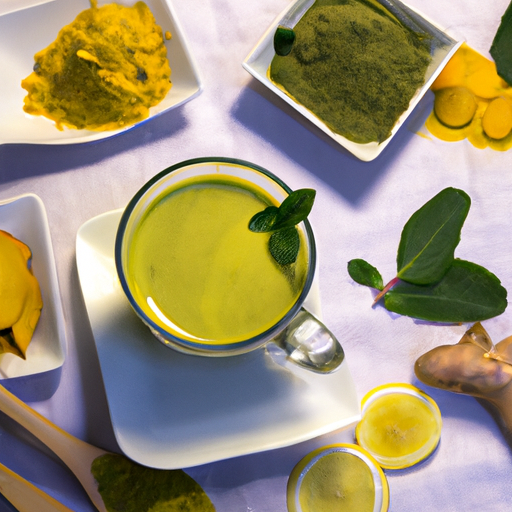Have you ever wondered if turmeric tea is really as beneficial as people claim?
Well, let me tell you, the answer might surprise you. Turmeric has been used for centuries in traditional medicine for its numerous health benefits. Its active compound, curcumin, has been studied extensively for its anti-inflammatory and immune-boosting properties.
In this article, we will explore the potential health benefits of turmeric tea and discuss the scientific evidence supporting its efficacy. We will also delve into the best practices for preparing and consuming turmeric tea, as well as any precautions or potential side effects to be aware of.
So, if you’re curious about incorporating turmeric tea into your daily routine, keep reading to discover the truth behind its medicinal abilities.
Key Takeaways
- Turmeric tea has anti-inflammatory and immune-boosting properties due to its active compound, curcumin.
- Turmeric tea may aid in weight management and improve skin conditions.
- Curcumin, found in turmeric tea, has been extensively studied for its anti-inflammatory, antioxidant, and anticancer properties.
- Turmeric tea can potentially help manage chronic conditions and alleviate symptoms such as pain and inflammation.
The History of Turmeric and its Medicinal Uses
Did you know that turmeric has been used for centuries in traditional medicine to treat a wide range of ailments? Turmeric, a bright yellow spice, has a long history of culinary uses throughout various cultures. From Indian curries to Thai dishes, turmeric has been a staple ingredient, not only for its vibrant color but also for its unique flavor.
However, its benefits extend beyond the kitchen. Turmeric has been a key component in traditional healing practices for centuries. In Ayurvedic medicine, which originated in India thousands of years ago, turmeric was used to treat digestive disorders, skin conditions, and even as a natural pain reliever. Similarly, in traditional Chinese medicine, turmeric was believed to have anti-inflammatory properties and was used to alleviate joint pain and inflammation.
These traditional healing practices recognized the medicinal properties of turmeric long before modern science caught up. And today, we now know that the active compound in turmeric, curcumin, is responsible for many of its health benefits. Curcumin has been extensively studied for its anti-inflammatory, antioxidant, and anticancer properties.
Understanding the active compound in turmeric, curcumin, is essential to fully appreciate the potential health benefits of turmeric tea. So, let’s delve deeper into the science behind curcumin and its role in promoting overall well-being.
Understanding the Active Compound in Turmeric: Curcumin
Curcumin, the active compound in turmeric, can really make a difference in improving your health, doesn’t it? Many studies have shown that curcumin supplementation can have numerous health benefits. However, it’s important to note that the bioavailability of curcumin is quite low. This means that your body may not be able to absorb it efficiently when consumed alone.
To enhance the absorption of curcumin, it’s often recommended to consume it with black pepper or fat, as these can increase its bioavailability.
Research suggests that curcumin has strong antioxidant and anti-inflammatory properties, which can help reduce the risk of chronic diseases such as heart disease, diabetes, and cancer. It may also play a role in improving brain health and reducing the risk of cognitive decline.
Now, let’s transition into the next section about the potential health benefits of turmeric tea. While curcumin supplementation may offer some health benefits, consuming turmeric in the form of tea provides a convenient and enjoyable way to incorporate this compound into your daily routine.
Potential Health Benefits of Turmeric Tea
By incorporating turmeric into your daily routine through a warm cup of golden elixir, you can potentially unlock a treasure trove of health benefits. Turmeric tea has gained popularity for its potential role in weight loss and skin health.
While more research is needed to fully understand the mechanisms behind these effects, preliminary studies suggest that turmeric tea may aid in weight management. One study found that curcumin, the active compound in turmeric, may help reduce weight gain and suppress fat tissue growth. Additionally, curcumin has been shown to have anti-inflammatory and antioxidant properties that may benefit the skin. Some research suggests that curcumin can help improve skin conditions such as acne, psoriasis, and eczema. However, it is important to note that more studies are needed to confirm these findings and determine the optimal dosage and duration of turmeric tea consumption for these specific benefits.
Transitioning into the next section, turmeric tea’s potential anti-inflammatory properties also deserve attention.
a. Anti-Inflammatory Properties
Unlock the power of turmeric tea and let its soothing warmth wash over you, easing the flames of inflammation within your body. Turmeric has long been renowned for its anti-inflammatory properties, making it a popular choice for those seeking natural remedies for inflammation.
Inflammation is a natural response by the body to protect against infection and injury, but chronic inflammation can lead to various health issues. Incorporating anti-inflammatory foods like turmeric into your diet can help reduce inflammation and promote overall well-being.
Curcumin, the active compound in turmeric, is believed to be responsible for its anti-inflammatory effects. It inhibits the production of inflammatory molecules in the body and also boosts the activity of the body’s natural antioxidant enzymes. Research suggests that turmeric can be effective in reducing inflammation in conditions such as arthritis, heart disease, and certain types of cancer.
While more studies are needed to fully understand the extent of turmeric’s anti-inflammatory benefits, its potential is promising. By incorporating turmeric tea into your daily routine, you can take a proactive step towards managing inflammation naturally. Soothe your body with the power of turmeric tea and experience the potential health benefits it offers.
Boosting immunity is another area where turmeric tea may play a role, providing a seamless transition into the subsequent section.
b. Boosting Immunity
Indulging in a cup of turmeric tea daily can fortify your immune system, empowering your body to ward off illnesses and embrace a vibrant, healthy life. Turmeric, with its active compound curcumin, has been shown to have powerful antioxidant and anti-inflammatory properties that can support immune function. Additionally, turmeric tea contains other beneficial compounds like vitamins and minerals that contribute to overall health.
To understand how turmeric tea boosts immunity, let’s take a look at its key components:
| Component | Boosts Energy | Relieves Stress |
|---|---|---|
| Curcumin | Yes | Yes |
| Vitamins | Yes | Yes |
| Minerals | Yes | Yes |
Curcumin, the star player in turmeric tea, has been found to enhance energy levels by increasing the production of ATP, the molecule responsible for cellular energy. It also helps relieve stress by modulating stress hormones and promoting a sense of calm.
By incorporating turmeric tea into your daily routine, you can give your immune system the support it needs to stay strong and resilient. And as we transition into discussing the next subtopic about improving digestive health, it’s important to note that a healthy immune system is closely linked to a healthy gut.
c. Improving Digestive Health
Turmeric tea is like a soothing elixir for your digestive system, helping to calm inflammation and promote optimal gut health. When it comes to improving gut health, turmeric has shown promising results. Curcumin, the active compound found in turmeric, has been found to have anti-inflammatory and antioxidant properties, which can help alleviate symptoms of indigestion.
Studies have shown that curcumin can help reduce inflammation in the gut, making it beneficial for those with digestive disorders such as irritable bowel syndrome (IBS) or inflammatory bowel disease (IBD). It can also help improve overall digestion by stimulating the production of bile, which aids in the breakdown of fats.
In addition to reducing inflammation, curcumin can also help alleviate symptoms of indigestion, such as bloating and gas. It works by increasing the production of digestive enzymes, which can help break down food more efficiently. This can lead to improved digestion and reduced discomfort after meals.
Overall, turmeric tea can be a beneficial addition to your daily routine if you’re looking to improve your digestive health. Its anti-inflammatory and antioxidant properties can help soothe inflammation in the gut and alleviate symptoms of indigestion.
Next, we’ll explore how turmeric tea can help in managing chronic conditions.
d. Managing Chronic Conditions
If you’re looking to manage chronic conditions, incorporating turmeric tea into your daily routine can provide potential benefits. Turmeric contains a compound called curcumin, which has been studied for its potential health benefits.
One of the ways turmeric tea may help with managing chronic conditions is by managing pain. Some studies suggest that curcumin may have analgesic properties, meaning it can help reduce pain.
Additionally, turmeric tea may help with reducing inflammation, which is often a key factor in many chronic conditions. Chronic inflammation can contribute to the development and progression of diseases such as arthritis, heart disease, and cancer. By reducing inflammation, turmeric tea may help alleviate symptoms and improve overall well-being.
While there is some evidence to support the potential benefits of turmeric tea in managing chronic conditions, it is important to note that more research is needed. Scientific studies on the efficacy of turmeric tea are ongoing, and it’s always best to consult with a healthcare professional before making any significant changes to your daily routine.
Scientific Studies on the Efficacy of Turmeric Tea
Contrary to popular belief, scientific studies have shown that incorporating turmeric tea into your daily routine can indeed provide potential benefits for managing chronic conditions. Here are three key findings from scientific research that highlight the health benefits of turmeric tea:
-
Anti-inflammatory properties: Turmeric contains a compound called curcumin, which has been extensively studied for its anti-inflammatory effects. Research suggests that regularly consuming curcumin-rich turmeric tea may help reduce inflammation in the body, which is a common factor in many chronic conditions.
-
Antioxidant activity: Turmeric is known for its powerful antioxidant properties. Antioxidants help protect the body against damage caused by free radicals, which are unstable molecules that can contribute to chronic diseases. Drinking turmeric tea, which is packed with antioxidants, may support overall health and well-being.
-
Potential pain relief: Some studies have suggested that curcumin in turmeric tea may have analgesic properties, making it potentially beneficial for managing chronic pain. While more research is needed to fully understand the mechanisms behind this, initial findings are promising.
Incorporating turmeric tea into your daily routine may offer potential health benefits for managing chronic conditions. Now, let’s explore the best practices for preparing and consuming turmeric tea.
Best Practices for Preparing and Consuming Turmeric Tea
To make the most out of your turmeric tea experience, it’s essential to follow these best practices for preparing and enjoying this golden elixir.
Turmeric tea offers a wide range of health benefits, including its anti-inflammatory and antioxidant properties. To prepare the tea, start by boiling water and adding a teaspoon of ground turmeric. Let it simmer for about 10 minutes to allow the flavors to infuse.
For better absorption of the beneficial compounds, it’s recommended to add a pinch of black pepper, which enhances the bioavailability of curcumin, the active compound in turmeric. You can also add a squeeze of lemon or a teaspoon of honey to enhance the taste.
Once the tea is ready, strain it into a cup and enjoy it warm. Remember to store any leftover tea in the refrigerator and consume it within 24 hours to maintain its freshness and potency.
These preparation techniques will ensure that you reap the maximum health benefits from your turmeric tea.
Moving on to precautions and potential side effects, it’s important to be aware of certain considerations when consuming turmeric tea.
Precautions and Potential Side Effects
Before indulging in the wonders of turmeric tea, it’s important to be aware of the precautions and potential side effects that come with its consumption. While turmeric tea offers numerous health benefits, it isn’t without its caveats. Here are some precautions and potential side effects to consider:
-
Allergies: Turmeric is a member of the ginger family, so if you have a known allergy to ginger, it’s possible you may also be allergic to turmeric.
-
Stomach issues: Turmeric has been known to cause stomach discomfort, such as bloating and gas, especially when consumed in large amounts.
-
Blood clotting: Turmeric possesses anticoagulant properties, which means it can slow blood clotting. If you have a bleeding disorder or are taking blood-thinning medications, consult with your healthcare provider before consuming turmeric tea.
-
Interactions with medications: Turmeric may interact with certain medications, including blood thinners, antacids, and chemotherapy drugs. It’s best to consult your doctor before incorporating turmeric tea into your routine if you’re on any medications.
-
Pregnancy and breastfeeding: Pregnant and breastfeeding women should exercise caution when consuming turmeric tea, as its effects on these conditions aren’t well-studied.
Now that we’re aware of the precautions and potential side effects of turmeric tea, let’s explore how we can incorporate this beneficial beverage into our daily routine without any hassle.
Incorporating Turmeric Tea into Your Daily Routine
To easily incorporate turmeric tea into your daily routine, try adding a teaspoon of turmeric powder to your morning smoothie or sprinkling it on top of your avocado toast for a delicious and healthy kick-start to your day. Not only does turmeric tea have potential health benefits, but it can also be a versatile and flavorful addition to various recipes.
When it comes to weight loss, turmeric tea may aid in the process. It has been suggested that turmeric can help increase metabolism and reduce fat tissue growth. To make a turmeric tea recipe for weight loss, simply boil water and add a teaspoon of turmeric powder. You can enhance the flavor by adding a squeeze of lemon or a dash of honey.
Additionally, turmeric tea has gained popularity as a natural beauty remedy. It contains antioxidants and anti-inflammatory properties that may help improve skin complexion and reduce acne. To incorporate turmeric tea into your beauty routine, you can use it as a facial toner or mix it with honey for a soothing face mask.
Incorporating turmeric tea into your daily routine can be as simple as adding it to your morning smoothie or sprinkling it on your avocado toast. Whether you’re looking to boost weight loss or enhance your natural beauty, turmeric tea may offer potential benefits.
Frequently Asked Questions
How long has turmeric been used for medicinal purposes?
Turmeric has been used for medicinal purposes for thousands of years. Its history dates back to ancient times, and it has been recognized for its numerous health benefits, including anti-inflammatory and antioxidant properties.
Can turmeric tea help with weight loss?
Yes, turmeric tea can help with weight loss. Studies have shown that it can boost metabolism and aid in appetite control. Incorporating turmeric tea into a balanced diet and exercise routine may support weight loss efforts.
Are there any risks associated with consuming turmeric tea?
There are potential risks associated with consuming turmeric tea, such as allergic reactions or interactions with certain medications. It’s important to consult with a healthcare professional before incorporating it into your routine to ensure its safety and effectiveness.
Can turmeric tea be used as a natural remedy for arthritis?
Turmeric tea is a natural remedy that has been used for arthritis. It contains curcumin, which has anti-inflammatory properties. While some studies suggest it may provide relief, more research is needed to confirm its effectiveness.
How does turmeric tea compare to other forms of turmeric consumption in terms of health benefits?
Turmeric tea offers similar health benefits as other forms of turmeric consumption, such as supplements and using turmeric in cooking. Research shows that the active compound in turmeric, curcumin, has anti-inflammatory and antioxidant properties, which can support overall health.
Conclusion
In conclusion, after examining the history, medicinal uses, and scientific studies on turmeric tea, it’s evident that this golden elixir offers a multitude of potential health benefits. It has potent anti-inflammatory properties and immune-boosting abilities. Turmeric tea can be a valuable addition to your daily routine. However, it’s important to note that individual results may vary, and precautions should be taken to avoid any potential side effects. As the old adage goes, "An ounce of prevention is worth a pound of cure." So why not sip on a cup of turmeric tea and give your health a natural boost?










